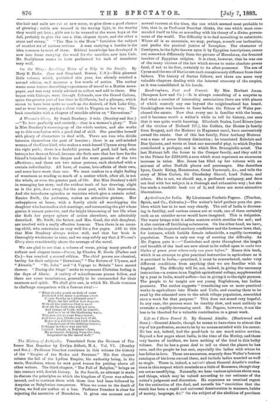The History of Antiquity. Translated from the German of Pro-
fessor Max Duncker by Evelyn Abbott, M.A. Vol. VI. (Bentley and Son.)—Professor Duncker continues in this volume the history of the "Empire of the Medes and Persians." His first chapter relates the fall of the Lydian Empire, his authority being, in the main, Herodotns, whom he sees good reason for putting above all other writers. The third.ehapter, "The Fall of Babylon," brings us into contact with Jewish history. In the fourth, an attempt is made to discuss the principles on which the kingdom of Cyrus was admin- istered, and to contrast them with those that had been followed by Assyrian or Babylonian conquerors. When we come to the death of Cyrus, we find.onr author at a loss. Professor Duncker is clear for rejecting the narrative of Herodotns. It gives one account out of
several current at the time, the one which seemed most probable to him, that is, as Professor Duncker thinks, the one which most com- mended itself to him as according with his theory of a divine govern- ment of the world. The difficulty is to find something to substitute. Where all is so uncertain, we may, perhaps, consult our inclination,. and prefer the poetical justice of Xenophon. The character of Cambyses, in the light thrown upon it by Egyptian inscriptions, comes out somewhat differently from the picture of Herodotus, the frenzied insulter of Egyptian religion. It is clear, however, that he was one of the many victims of the law which seems to make absolute power fatal, if not to its first, certainly to its after-possessor. The son of Cyrus and the son of Darius are each conspicuously different from their fathers. The history of Darius follows, and there are some very valuable chapters dealing with the internal economy of tho empire, as it was consolidated in his hands.


































 Previous page
Previous page